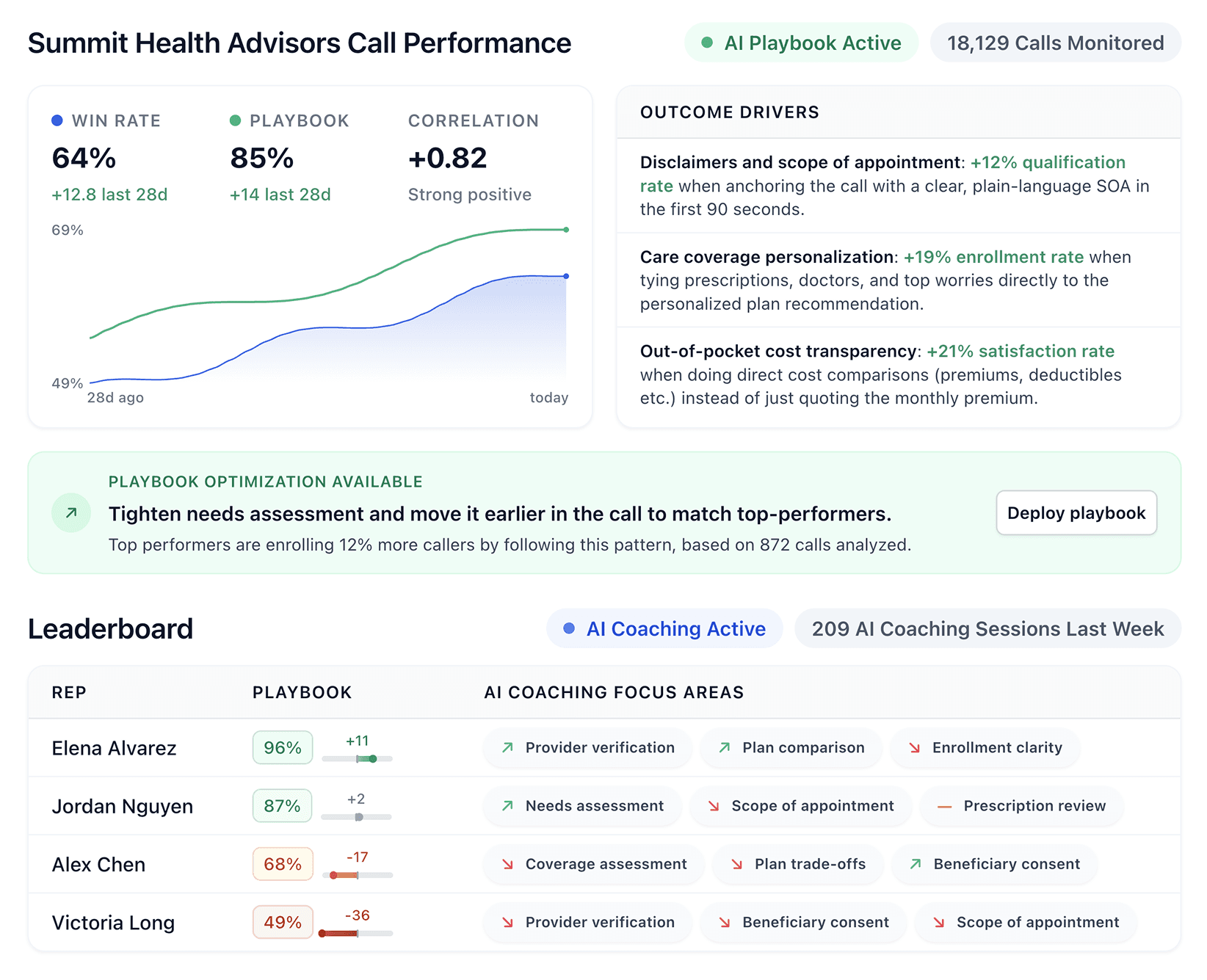
Written by
Eloisa Mae

Reviewed by
Henry Dornier
Published on
Nov 3, 2025
Most sales centers have a few reps who consistently crush their numbers while everyone else struggles to hit quota.
These 21 call center sales tips come from analyzing thousands of high-converting calls to reveal exactly what separates your top performers from the rest of your team.
1. Master the first 30 seconds
The opening determines whether a prospect stays engaged or checks out mentally. Your greeting needs to do three things:
Identify yourself.
Establish relevance.
Give the caller a reason to keep listening.
Skip the script that sounds like every other call center. Instead, reference something specific about the caller's situation. "I see you requested information about coverage options for your family," beats "How are you today?" every time.
Top performers match their tone to the caller's energy level within seconds. An excited caller gets enthusiasm back. A cautious one gets calm confidence.
2. Ask questions that qualify fast
Inbound call center sales tips always emphasize qualifying, but most agents ask the wrong questions. Don't interrogate callers with a checklist. Guide them toward revealing what matters.
Questions that work:
"What prompted you to look into this today?"
"What's your biggest concern about your current situation?"
"If you could wave a magic wand, what changes?"
These questions uncover pain points without feeling invasive. Callers volunteer information when they feel heard, not processed.
Document responses immediately. Your call detail reporting software should capture these insights so you can reference them later without asking twice.
3. Handle objections before they surface
Call center sales tips for agents often miss this: Objections are predictable. You've heard the same five concerns dozens of times this week.
Address common objections before they come up. "Most people wonder about the cost upfront, so here's how the payment structure works," stops price resistance before it builds.
When objections come up, pause before you respond. That two-second silence shows you're thinking about their concern instead of jumping to your next point.
The most common objections include price, timing, competitors, and fear of commitment. Your response should recognize their concern, give them context, and show them a clear next step.
4. Use social proof strategically
Successful call center strategies incorporate customer stories, but generic testimonials don't move the needle. Your proof needs to match the caller's situation.
"We work with over 500 families," means nothing. "I helped a family of four in a similar situation save $200 monthly," creates a connection.
Reference specific outcomes tied to the caller's pain points. Numbers make stories believable. Vague success claims make prospects skeptical.
5. Create urgency without pressure
Artificial urgency kills trust. Real urgency comes from helping callers understand the cost of waiting.
Instead of "This offer expires tonight," try "Most people who wait end up paying 15-20% more when rates adjust next quarter." You're educating, not manipulating.
Time-sensitive opportunities work when they're genuine. If enrollment periods, rate changes, or inventory actually create deadlines, explain why those deadlines exist.
6. Balance service and sales in every call
Your approach and attitude matter even when your goal is revenue. Callers can tell when you're pushing a sale versus solving their problem.
The best performers alternate between listening and guiding. They ask clarifying questions, confirm understanding, and then recommend solutions that fit. This rhythm builds trust while moving toward a close.
Track how often your agents reference the caller's specific situation versus generic product features. High converters mention the caller's words back to them frequently.
7. Personalize every sales call
Start by treating each interaction as unique. Your customer relationship management (CRM) data should inform the conversation from the start.
"I see you've been a customer for three years," or "You called about this last month," shows you value their history. Callers hate repeating themselves.
Use the caller's name naturally throughout the conversation, but don't overdo it. Once every couple of minutes feels conversational. Every sentence sounds robotic.
Successful call center strategies incorporate this personalization consistently across every call.
8. Master the trial close
Trial closes test readiness without forcing a decision. They give you information about objections and buying signals.
"Does this solution address what you were looking for?" opens dialogue. The answer tells you whether to keep explaining or move toward closing.
Watch for verbal cues: "That makes sense," "I like that," or "Okay" with rising inflection all signal readiness. Hesitation or questions indicate you need to cover more ground.
9. Use technology without losing the human touch
The right tools help your agents sell more, but they work best when they support natural conversations instead of forcing scripts. Your performance system should point out coaching moments without controlling every word your reps say.
Real-time prompts work when they're contextual. "This caller mentioned price twice" helps. "Say these exact words" doesn't.
Automated quality management catches mistakes, but your best reps learn from reviewing their own successful calls. They can hear what worked and repeat it.
10. Adapt to remote and hybrid team dynamics
Remote teams stay sharp when you document what works and hold regular skill shares. Your playbook needs to exist outside individual heads when the team works from different locations.
Record training sessions showing your top performers in action. New hires learn faster from real examples than from reading guides. Watching how a closer handles a tough objection teaches more than any written description.
Schedule weekly 15-minute peer reviews where reps share their best call of the week. Competition drives improvement when it's friendly.
11. Track metrics that actually matter
Sales effectiveness in a call center comes down to conversion rate, average deal size, and time to close. But those lag indicators don't tell you what to fix.
Leading indicators to track:
First call resolution rate
Objection-to-close ratio
Talk-to-listen ratio
Questions asked per call
Personalization frequency
Your call center agent scorecard should track these specific behaviors alongside conversion rates to identify exactly what drives results. Monitor performance trends weekly, not monthly. Fast feedback loops help agents adjust before bad habits set in.
12. Build scripts that guide, don't restrict
Scripts get a bad reputation because teams treat them like word-for-word transcripts instead of flexible frameworks.
Your script should provide guardrails: key points to cover, questions to ask, and transitions between topics. But the exact words change based on the conversation flow.
Top performers internalize frameworks, not scripts. They know which topics to cover and in what order, but they adjust language to match each caller.
13. Practice active listening
Inbound call center sales tips emphasize talking, but listening converts more calls. When callers feel heard, they open up about their real concerns.
Reflect back what you hear: "So you're worried about coverage gaps during the transition, is that right?" This confirms understanding and shows you're paying attention.
Take notes during every call. Writing forces you to process what the caller is saying rather than waiting for your turn to talk.
14. Close with clarity
Vague endings waste conversions. After you've addressed concerns and confirmed fit, ask for the sale directly.
"Based on everything we discussed, does this plan work for your family?" converts far better than, "So what do you think?
If they agree the plan works for them, confirm next steps immediately. If they hesitate, ask what's holding them back. That question either surfaces a final objection you can address or reveals they need more time to decide.
15. Follow up strategically
Most "not ready" calls become sales with proper follow-up. The key is timing and relevance.
Send a recap email within an hour summarizing what you discussed and the next steps. Reference specific parts of your conversation so it feels personal, not automated.
Schedule follow-up calls for when the caller indicated they'd be ready to decide, not just "next week." "You mentioned checking with your spouse tonight, so I'll call you tomorrow at 2 p.m." gets better results than generic follow-ups.
16. Learn from every call
Your contact center performance management system should make it easy to review calls and identify patterns. Which approaches worked? Where did prospects disengage?
Top performers listen to their own calls weekly. They catch filler words, missed opportunities, and moments where they could have asked better questions.
Create a culture where reviewing calls is normal, not punishment. When agents see it as skill development rather than criticism, they engage with the feedback.
17. Empower agents with real-time coaching
The best call center sales tips come from immediate feedback, not quarterly reviews. When a manager can flag a coaching opportunity while the call is fresh, the learning sticks.
Your automated quality management system should surface these moments automatically. "This call had three objections and a low engagement score," tells managers where to focus coaching time.
Agents who receive specific, timely feedback improve faster than those who get generic monthly reviews.
18. Optimize your calling strategy
The time when you call matters as much as what you say. Analyze your call detail reporting software to find patterns in successful conversations.
Some time slots consistently convert better. Some days see higher pickup rates. Some caller profiles respond better to certain approaches.
Use this data to assign your strongest reps to your highest-value time blocks. Match agent strengths to caller profiles when possible.
19. Create a knowledge base that agents actually use
Most call center knowledge bases collect outdated information that nobody maintains. Your agents waste time searching for answers while their callers sit on hold.
Your knowledge base should answer the 20 questions agents ask most frequently, not every possible scenario. Update it weekly based on common stumbling points.
Tag articles by topic and objection type so agents can find relevant information in seconds, not minutes.
20. Scale what works with AI and automation
AI is changing call centers, but most platforms track basic metrics. You need technology that shows why your top performers win and teaches those methods to your team.
AI agents handle after-hours lead qualification and scheduling so that your human reps focus on sales conversations. Your best closers shouldn't spend time gathering basic information.
The right platform analyzes every call to find winning behaviors, then coaches other reps to use those same techniques. Your average performers start to sound like your top performers.
21. Train for objections, not just features
Product knowledge matters, but objection handling separates closers from order-takers. Role-play common objections until responses feel natural.
The most common objections in call center sales are:
Price concerns
Need to consult with others
Competitor comparisons
Timing issues
Trust hesitation
Your team should have proven responses for each common objection. Build frameworks that adapt to each caller's specific situation rather than rigid scripts they recite word-for-word.
Turn call recordings into a competitive advantage with Alpharun
You're already recording every call. Those recordings contain the exact blueprint for better performance, but nobody has time to analyze thousands of hours of audio.
Our solution does it for you. We find the patterns your top performers use and scale them across your entire team through real-time coaching. You get a system customized for you with company-specific lead-discovery tactics.
Why teams choose us:
We study your best reps to build a playbook that fits your business, industry, and compliance rules.
Reps get coaching on real moments from their calls, with clear examples of what top performers do.
AI agents handle scheduling and after-hours leads so your team can focus on selling.
Managers spot exactly where reps need help and who's ready to advance, without listening to calls manually.
We're SOC 2 Type 2 and HIPAA certified for teams in regulated industries.
Your top performers didn't get there by accident. Let's bottle what they do and give it to everyone else. See how it works with a demo using your real calls.
Frequently asked questions
Can inbound sales calls convert better in a call center setting?
Inbound sales calls convert better in call centers that coach agents on proven techniques rather than generic scripts.
Centers with strong coaching systems see higher conversion rates because they identify what top performers do differently and teach those specific behaviors to the entire team.
What are the most common objections in call center sales?
The most common objections in call center sales are price concerns, timing issues, the need to consult others, competitor comparisons, and trust hesitation.
Top performers address these objections proactively during their pitch rather than waiting for the caller to raise them first.
What tools help call center agents improve sales performance?
Call detail reporting software, automated quality management systems, and contact center performance management platforms help agents improve sales performance.
The best tools identify winning behaviors from top performers and coach other reps to adopt those same techniques in their own calls.
How do you balance service and sales in the same call?
You balance service and sales by alternating between listening and guiding throughout the conversation.
Reference the caller's specific situation frequently. Then confirm understanding before recommending solutions, and focus on solving their problem before pushing toward your quota.
What metrics should I track to evaluate sales effectiveness in a call center?
Track conversion rate, average deal size, objection-to-close ratio, talk-to-listen ratio, and first call resolution rate to evaluate sales effectiveness.
Leading indicators like questions asked per call and personalization frequency predict outcomes better than lag measures alone.
How can remote or hybrid call center teams maintain consistent sales quality?
Remote or hybrid call center teams maintain consistent sales quality through documented playbooks, recorded training sessions from top performers, and weekly peer review calls.
Use your contact center performance management system to flag coaching opportunities quickly so feedback stays timely and relevant.



